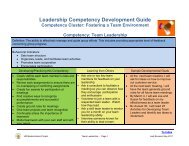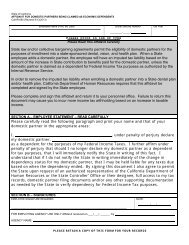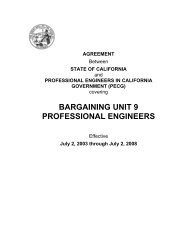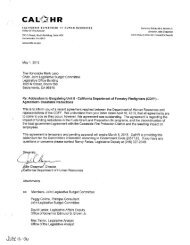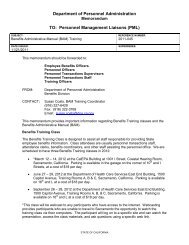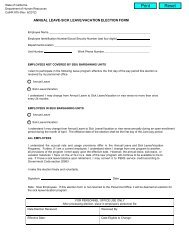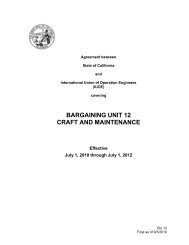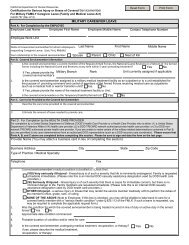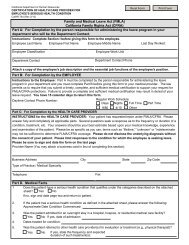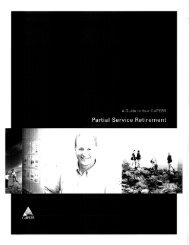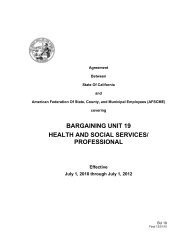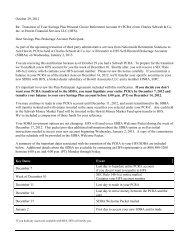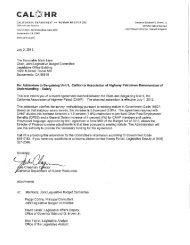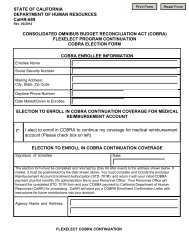Memorandum of Understanding with Unit 12 - Dpa - State of California
Memorandum of Understanding with Unit 12 - Dpa - State of California
Memorandum of Understanding with Unit 12 - Dpa - State of California
Create successful ePaper yourself
Turn your PDF publications into a flip-book with our unique Google optimized e-Paper software.
7.10 Calls to Work/Scheduled OvertimeA. An Employee who has completed a normal work shift, when ordered back to work, shallbe credited <strong>with</strong> a minimum <strong>of</strong> four hours' work time provided the call back to work is <strong>with</strong>outhaving been notified prior to completion <strong>of</strong> the work shift.When such an employee is called back under these conditions <strong>with</strong>in four hours <strong>of</strong> thebeginning <strong>of</strong> a previous call or an additional call is received while still working on an earliercall back, the employee shall not receive an additional four hours credit for the new callback.When such an employee is called back <strong>with</strong>in four hours <strong>of</strong> the beginning <strong>of</strong> the employee'snext shift, an employee shall be compensated only for the hours remaining before thebeginning <strong>of</strong> the employee's next shift.B. When staff meetings, training sessions, or work assignments are scheduled on anemployee's authorized day <strong>of</strong>f, the employee shall be scheduled for a minimum <strong>of</strong> four (4)hours' work. When the employee is notified prior to completion <strong>of</strong> his or her work shift andthe work begins less than three (3) hours after completion <strong>of</strong> the work shift, the employeewill be credited for the hours actually worked; if the work begins more than three (3) hoursafter the completion <strong>of</strong> the work shift, the employee will be scheduled for a minimum <strong>of</strong> four(4) hours <strong>of</strong> work.C. For reporting purposes, compensable time for all overtime begins when the employeereports to headquarters or the job site when the employee is not required to report toheadquarters. Job site may be interpreted as an "assembly point" when authorized by theappointing authority. Compensable time ends upon completion <strong>of</strong> the job and return toheadquarters. If the employee is not required to return to headquarters, compensable timeends upon completion <strong>of</strong> the job at the job site or return to the assembly point whenauthorized.D. A callback situation does not exist when an employee is ordered to temporarily report fora different work shift in lieu <strong>of</strong> his/her regular one because either:1. The employee was alerted to the possibility <strong>of</strong> a sudden shift change before theend <strong>of</strong> the regularly scheduled shift, or2. The employee's assignment necessitates unexpected shift changes.E. Overtime hours will be paid at the overtime rate established in this Agreement after theemployee has worked forty (40) hours in the work week.F. When a Caltrans employee receives a call to work while not on duty (i.e., neither during aregular work shift nor an overtime assignment), compensable time starts when theemployee leaves home enroute directly for the call back and ends when the employee hasreturned home by the most direct route. Travel time for a call to work will not be paid whenthe employee is ordered to report early for a scheduled workshift even though the order toreport early is made while the employee is not at work.When a Caltrans employee receives a call to work which results in an additional commuteduring the workweek, the employee shall be reimbursed for travel mileage, to and from thereport location, in accordance <strong>with</strong> applicable contract provisions and/or rules. Suchmileage reimbursement shall not exceed a total <strong>of</strong> fifty (50) miles for each call back.52BU <strong>12</strong>(99-01)



